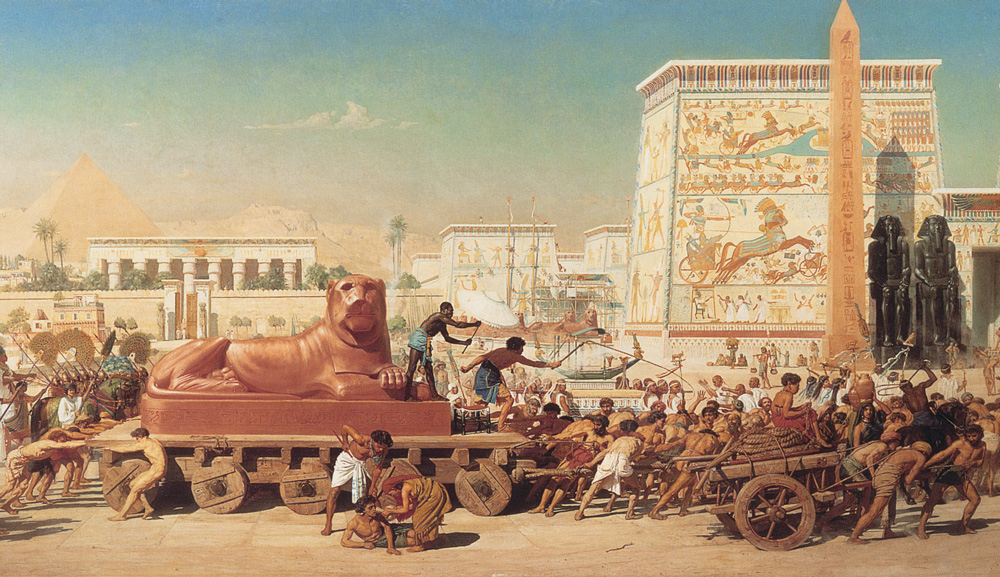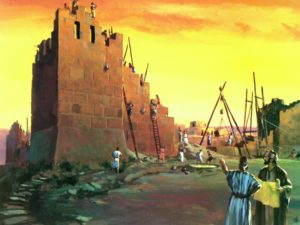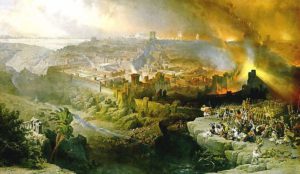In Lesson 2 we learned about the Pilgrim Period of Israel’s history. An important item within that period was the establishment of God’s covenant promise to be accomplished through the bloodline of Abraham. In Lesson 3 we begin to see the covenant promises of Genesis 12:1-3 take shape and form. Follow along as this lesson provides what you need to know about the Egyptian Period (Genesis 47 – Exodus 15).
Overview– By Genesis 47, Israel and all his family have moved to Egypt to escape famine. Unknowingly, they are jumping out of the fire and into the frying pan. Things will be okay though, because God promised to bless the earth through Israel (Gen. 28:14), and His promise will be fulfilled (Heb. 6:18). The scene is almost set for the greatest redemptive act in history, second only to the release from bondage that occurred on the cross of Calvary. The exodus (lit. “going out”) of Israel through the Red Sea is that very act of redemption. Bondage to Pharaoh necessarily precedes this act. Pharaoh is Satan’s offspring and agent used to bruise the heel of the Seed (Gen. 3:15). As sure as God said the Seed would not be exterminated, God predicts deliverance from bondage in Genesis 15:13-14 and Exodus 6:6-8, and that is exactly what happens when God crushes the head of Pharaoh and Satan through 10 divine signs/plagues. Israel goes out of Egypt to approach Sinai and become God’s covenant people in keeping with God’s promise to Abraham, Isaac, and Jacob back in the Pilgrim Period.
Key Verses
![[Tags] Rest-300x300 Lesson 3- What You Need to Know About the Egyptian Period](https://fiveminutebiblestudy.com/wp-content/uploads/2018/02/Rest-300x300.jpg)
1. There are a handful of thematic verses within this period of Bible history. These verses do well in connecting the dots of the Bible story. Perhaps the most important verse of all is found in Genesis 49:10. Here, Jacob, by inspiration, promises Judah that the Seed will proceed from his bloodline. Perhaps it is because of the soon to be bondage and servitude in Egypt that this prophecy describes the Seed to come through Judah as a Rest Bringer (Shiloh) and one who will rule with kingly authority (i.e. “the scepter”). These characteristics are descriptive of God’s actions during the exodus sequence, and ultimately they are fulfilled in Jesus Christ, the Seed of Eve (Matt. 11:28-30 & John 18:37).
2. Another key verse in this period is Exodus 6:6-8. These verses preview God’s plan to redeem Israel through exodus, and they make plain that it is indeed a redemptive act. More importantly, these verses make it severely plain that the story of redemption that beginning in the Garden of Eden and continued with Abraham in Canaan, this is the same story and plan at large in Egypt. Abraham, Isaac, Jacob, and the covenant of land and blessing are specifically mentioned (see also 2:24 & 3:6-4:5). Will God indeed bless the whole world through a single redemptive act based on a covenant promise? The Egyptian Period keeps that hope very much alive.
Important Events
![[Tags] Rest-300x300 Lesson 3- What You Need to Know About the Egyptian Period](https://fiveminutebiblestudy.com/wp-content/uploads/2018/02/passover-lamb-300x156.jpg) 1. Key events in the Egyptian Period are very important to the Bible’s redemptive story. The Passover, ordered and observed in Exodus 12 becomes an annual affair in Israelite history. This sacred meal contains illustrious symbolism fulfilled in Jesus Christ, the Lamb of God. The ceremony was to mark the beginning of the Israelite’s calendar year, annually reminding them of their bondage in Egypt and God’s salvation from the death angel that passed over the Israelite’s houses in Egypt. This meal is inseparable from the exodus event. It was while the Israelite’s were eating this meal and Pharaoh’s son was taking his last breath that this agent of Satan yelled out, “Rise, go out from among my people, both you and the children of Israel!” (Exodus 12:31). It is no coincidence that Jesus ate the Passover directly before redeeming mankind from the bondage of sin on the cross (see Luke 22). Neither is it accidental that Jesus instituted what we call the Lord’s Supper directly after the Passover (see also Luke 22). There are undoubted parallels between these two meals. Studying the Passover regulations of Exodus 12 is revelatory to understanding Jesus’ ordinance of His communion supper, and it explains why Paul made such an ordeal about the proper observance of this supper in 1 Cor. 11.
1. Key events in the Egyptian Period are very important to the Bible’s redemptive story. The Passover, ordered and observed in Exodus 12 becomes an annual affair in Israelite history. This sacred meal contains illustrious symbolism fulfilled in Jesus Christ, the Lamb of God. The ceremony was to mark the beginning of the Israelite’s calendar year, annually reminding them of their bondage in Egypt and God’s salvation from the death angel that passed over the Israelite’s houses in Egypt. This meal is inseparable from the exodus event. It was while the Israelite’s were eating this meal and Pharaoh’s son was taking his last breath that this agent of Satan yelled out, “Rise, go out from among my people, both you and the children of Israel!” (Exodus 12:31). It is no coincidence that Jesus ate the Passover directly before redeeming mankind from the bondage of sin on the cross (see Luke 22). Neither is it accidental that Jesus instituted what we call the Lord’s Supper directly after the Passover (see also Luke 22). There are undoubted parallels between these two meals. Studying the Passover regulations of Exodus 12 is revelatory to understanding Jesus’ ordinance of His communion supper, and it explains why Paul made such an ordeal about the proper observance of this supper in 1 Cor. 11.
![[Tags] Rest-300x300 Lesson 3- What You Need to Know About the Egyptian Period](https://fiveminutebiblestudy.com/wp-content/uploads/2018/02/crossing-red-sea-300x174.jpg) 2. The Exodus is the most important event in this period, but it hardly needs special mention at this point of the study. Hopefully, the significance of this single event in Israel’s history and redemption’s history has been made clear. For further study of this event and its influence on the rest of Biblical history, click here to read the Five Minute Bible Study entitled Finding the Exodus from Genesis to Revelation, and click here to read another five minute study: Finding the Exodus from Matthew to Revelation. The bottom line is this, “Exodus is about rescue from human bondage and rescue from sin’s bondage,” (The New American Commentary on Exodus by Douglas Stuart).
2. The Exodus is the most important event in this period, but it hardly needs special mention at this point of the study. Hopefully, the significance of this single event in Israel’s history and redemption’s history has been made clear. For further study of this event and its influence on the rest of Biblical history, click here to read the Five Minute Bible Study entitled Finding the Exodus from Genesis to Revelation, and click here to read another five minute study: Finding the Exodus from Matthew to Revelation. The bottom line is this, “Exodus is about rescue from human bondage and rescue from sin’s bondage,” (The New American Commentary on Exodus by Douglas Stuart).
Conclusion– Thank you for reading Lesson 3 in the series What You Need to Know About the Old Testament. Next week we will study What You Need to Know About the Wilderness Period which spans Exodus 16 through the end of Deuteronomy!
Helpful Resources- 1) The New American Commentary on Exodus by Douglas Stuart 2) Introduction to Biblical Studies by James Smith 3) What the Old Testament Authors Really Cared About by Jason DeRouchie



